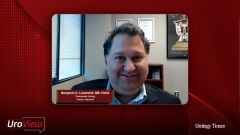
AR-targeted therapies for advanced prostate cancer
Julie N. Graff, MD, of OHSU Knight Cancer Institute, comments on the impact of the availability of newer-generation androgen receptor inhibitors on treatment outcomes for patients with advanced prostate cancer.
Episodes in this series

Benjamin H. Lowentritt, MD, FACS: Today, we’re mainly talking about all the androgen receptor [AR] inhibitors that have come out in the last 10 years. Do you want to give a quick review about these, and what we’ll be talking about the rest of the day?
Julie N. Graff, MD: Yes. I had the pleasure of starting my training in medical oncology in 2006 and completing it in 2009, and things have been changing rapidly ever since. I got to start in the low of, “Do we start this patient on chemotherapy or not? Or do we radiate it?” For 6 years, all we had was chemotherapy for metastatic castration-resistant prostate cancer. When I and probably a lot of people watching started, we used to call it hormone-insensitive, right? The thought was that castration doesn’t work anymore, so it’s not sensitive to hormones. Thanks to people who do great laboratory work, we figured out that the androgen receptor is still very active and the cancer cells still express PSA [prostate-specific antigen]. There’s all this evidence that hormones are still important.
We began to focus more on contributions of hormones outside the testicles, such as the adrenal glands and even the cancer itself. And then these androgen receptors came to light. Ben, I know you’re familiar with bicalutamide, nilutamide, and flutamide, which were around in the 1990s, that were targeting the androgen receptor but didn’t do a great job of it. Now that we have these newer drugs, specifically enzalutamide, apalutamide, and darolutamide, which are next-generation—second- and third-generation androgen receptor antagonists—the game has really changed. When we were working with bicalutamide, we had a study that showed bicalutamide plus hormone deprivation therapy, by that I mean castration, was better than hormone castration alone. Then another study showed the opposite, or that it at least wasn’t as good.
But with these newer studies, we have convincing data in multiple stages of the disease from newly diagnosed to metastatic castration-resistant that we’re helping men live longer. Some say these newer androgen receptor therapies bind 1000 times tighter to the androgen receptor than bicalutamide would. They inhibit its translocation into the nucleus and its binding to the DNA. These are very powerful drugs. I tell my patients that they also have more serious adverse effects than bicalutamide does. Enzalutamide and apalutamide in particular can cause seizures, so it’s crucial to ask your patient if he has a history of seizure. Certainly, I sometimes see patients who are on a seizure medication, and I say that we can’t use those two2. I know we’re going to get into the trials more. Darolutamide didn’t make that distinction.
In the field, when I see someone with metastatic castration-resistant prostate cancer, my first line is usually to continue the castration and then add either abiraterone or a next-generation androgen receptor antagonist. You asked about AR inhibitors, and I immediately think of enzalutamide and these kinds of drugs, but there’s also abiraterone that came on the scene earlier than the other ones by a year or two. What it does is it blocks the adrenal contribution to hormones. I like to use that drug pretty early on, too. It’s the only one that’s generic and much less expensive than the others.
Transcript edited for clarity.
Newsletter
Stay current with the latest urology news and practice-changing insights — sign up now for the essential updates every urologist needs.







